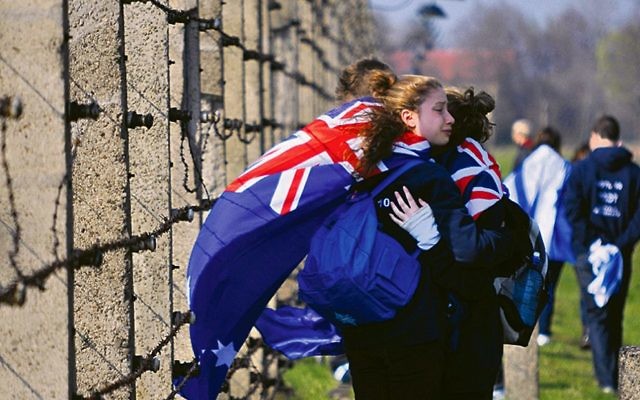‘We need compulsory Holocaust education’
I SOMETIMES wonder what would happen if I walked down any street in our capital cities and did an impromptu quiz with passers-by on their knowledge of the Holocaust, writes Dvir Abramovich.
I SOMETIMES wonder what would happen if I walked down any street in our capital cities and did an impromptu quiz with passers-by on their knowledge of the Holocaust, writes Dvir Abramovich.
Would they know what it was? When it happened and where? How many were murdered and who? Could they name a death camp or a ghetto out of the more than 40,000?
I suspect that I would get an array of, “I don’t know”, “not sure”, or just wrong answers. Worse, I would not be surprised by the critical gaps and lack of basic historical understanding of this tragedy.
We live in a turbulent moment in time with the cancer of antisemitism, which for a while was in remission, now back with a vengeance we thought inconceivable a few years ago. With right-wing nationalism, white-supremacism and neo-Nazism growing across Australia, we are facing an escalating crisis of intolerance that must be tackled head-on.
For more than a decade, I have been publicly pushing for mandatory Holocaust education, believing that this is not just a “Jewish issue” but one that goes to the very core of who we are as human beings and touches on our fundamental identity as a multicultural, respectful nation.
You would think that Holocaust education in every school would be a given, but to date only NSW has made this subject obligatory for all students in years 9 and 10.
I am far from being a lone voice.
Last year, at an event marking 25 years since the release of Schindler’s List, Steven Spielberg argued that every public high school in the United States should be required to teach the Holocaust.
We need to be proactive in addressing the serious deficiency in Shoah facts that is afflicting our communities across the board.
Across the world, numerous surveys have shown that beyond superficial familiarity, baseline Holocaust awareness is worryingly low.
This woeful ignorance makes people susceptible to outright denial, to falsehoods diminishing the historical record, and to blatant trivialisation which is becoming routine in Australian politics and life.
Mark Zuckerberg’s comments that Holocaust denial should be allowed on Facebook because it could be unintentional was a wake-up call that we have much work to do.
Studies have proven that those with deeply veined understanding of the Holocaust’s universal lessons were more likely to speak out when they saw racism unleashed around them.
They developed a respect for difference, understood where racism can ultimately lead, and realised how our fragile democracy can be destroyed by hatred and how it was up to them to protect our precious freedoms.
Above all, a profound comprehension of the processes that led to the worse state-sponsored mass murder in history is a vital tool in combating all forms of prejudice.
The 2004 documentary Paper Clips shows how students at an American school who knew nothing about the Nazi genocidal campaign were motivated to produce their own unique tribute to victims after their principal instituted binding Holocaust classes. The students collected 11 million paper clips to represent the six million Jews and five million other victims.
Studying the Holocaust makes students appreciate how unchecked hate, scapegoating and stereotyping can result in horrific acts of extermination, and how through their individual choices they can build a society of acceptance, empathy and compassion.
Elie Wiesel maintained, “Fear not the cruelty of the oppressor but the apathy of the bystander.”
Holocaust education is a moral necessity to impart the values of standing up against hatred that threatens everyone.
Educators are the first line of defence in pushing back against the significant rise in xenophobia and bias we are witnessing.
A survivor once told me, “It’s important to teach your children, but it’s not enough to teach just your children.”
I admit that a lot of the blame for the fact that many are practically illiterate when it comes to the Holocaust lies with us.
It is time that we start vigorously advocating for this issue to be put on the agenda, and urge others to exercise their clout and champion this cause.
Following the May election, the ADC plans on reaching out to the federal government to convince them not only to legislate a compulsory national Holocaust syllabus, but to set aside specific funding to provide teachers across the country with access to quality resources and the training necessary to make this a reality.
It will take perseverance and determination to have this difficult conversation and to drive this crusade.
A poll conducted by the Claims Conference showed that 41 per cent of Americans, and 66 per cent of millennials did not know what Auschwitz was, including a stunning 22 per cent that had not even heard of the Holocaust.
And a 2018 CNN poll revealed that 32 per cent of Europeans knew “just a little or nothing at all” about the Holocaust, while a 2019 survey found that one in 20 British adults did not believe the Holocaust happened and eight per cent said that the scale of the genocide has been exaggerated.
If this is happening while survivors are still with us, imagine the situation when they are no longer here to tell their stories.
If we stand on the sidelines and do nothing, memory of this catastrophe may quickly fade into the distant past, and we run the risk of future generations knowing very little.
That would diminish our solemn promise of “Never Again”, and is something I cannot, and will not accept.
Dvir Abramovich is chairman of the Anti-Defamation Commission.


comments